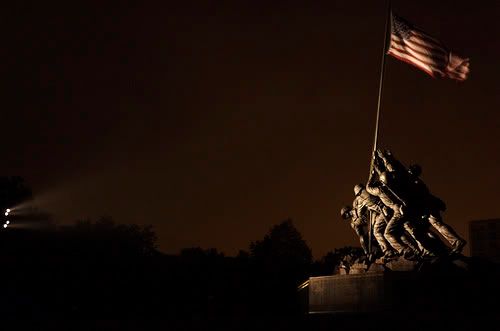What about the troops?

PETE HEGSETH'S ARTICLE - Yesterday, Columbia University was blessed by the presence of the Iranian president Mahmoud Ahmadinejad, along with his host of denials ("there are no gays in Iran," "the holocaust was fabricated, " and "Iranian women are happy.") And while Columbia's president attempted to hit Ahmadinejad with tough questions, the loud applause from the audience, along with Ahmadinejad's very presence were sufficient indication of the political environment at Columbia. Free speech above all else; unless, of course, we don't agree with you. Ahmadinejad, while certainly a controversial figure at Columbia, has done enough Bush-bashing and America-cursing to earn him more respect than, say, anyone in the Bush administration.
I spent yesterday on a college campus as well. An hour outside of New York City at Princeton University, the setting was tranquil and subdued. As you would expect, students slowly walked to class, bearded professors led stoic discussions in beautiful classrooms, and community poster boards displayed the latest campus outrage ("Why are there no motion sensitive lights in the Graduate college!?!").
And while I didn't expect a fury of activity at Princeton, I was struck by its complete removal from the outside world. War and peace, while discussed from textbooks, are not felt here. And if they're not felt here—where ROTC is allowed on campus—then I'm certain they are not felt at Columbia. Hence, inviting a man who sanctions the killing of American soldiers in Iraq is considered edgy and engaging, rather than shameful and disgusting.
I share the frustration of my fellow soldiers and Marines when they say, "The country is not at war, we're at war." They are, in most ways, correct. However, for the majority of Americans, the war doesn't directly affect them so they don't pay close attention. Daily life overwhelms developments on a distant battlefield. But in academia, places like Columbia and Princeton, war is supposed to be studied and discussed, by the brightest minds of the next generation.
But, alas, we all know that war is not studied at "elite" institutions today (neither is morality, but that's another topic). It's shunned and trivialized. And therefore, when a murderous dictator comes to campus and spews his international talking-points, everyone nods and congratulates each other for "mutual understanding." But for the American soldier, the words and actions of this man have real consequences - and they're taken the life of his comrades on the battlefield. This should be reason enough to deny a man like Mahmoud Ahmadinejad a platform to speak.

0 comments:
Post a Comment